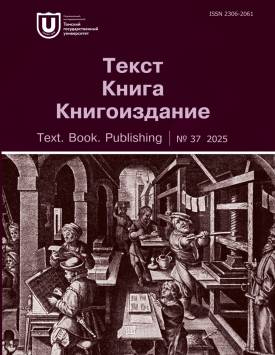Crime and Punishment by Dostoevsky in modern Russian literature: Between remake and pastiche
The article deals with two types of creative reception of Crime and Punishment in the prose of modern Russian authors - the remake and the pastiche. The former gained popularity after the commercial success of the novel F.M. by Boris Akunin. The main lines of influence of F.M. on the prose of the 2000s were the doubling of criminal intrigue, the simplification of psychological motivations, the multiplication of the number of criminal characters and the use of large fragments from Dostoevsky's novel to motivate the credibility of the found manuscript. In the context of the remake, we analyze the works of O. Seledtsov (the novel Crime and Punishment. Century XXI) and S. Shulyak (the novel Apartment Number Nine), little-known writers whose works have not been noticed by literary critics. In addition to the inevitable actualization of the remakes' depicted reality, they use the precedent signs of the novel (key quotes, the names and ages of the characters, an axe). The character system and plot of Dostoevsky's novel are reduced to Raskolnikov's crime. The criminal intent of the protagonists emerges due to reading Dostoevsky's classic novel, imitating it and trying to adjust it towards the psychological invulnerability of the killer. In the pastiches of two writers of the St. Petersburg school of Russian literature - Dostoevsky as a Russian Folk Tale (1991) by A. Levkin and Vignettes to Dostoevsky (2006) by Figl'-Migl', the plot is reduced, the connections between the fragments of the text are weakened. Quotations and paraphrases from Dostoevsky's novel become the full or partial basis of the text. The protagonist's criminal intent is replaced with meeting the female characters of the novel, wandering around the city and experiencing painful states. Levkin's protagonist is an unnamed "young man", who combines in himself parts of Raskolnikov, Svidrigailov and other Dostoevsky's characters, as well as Nabokov's Humbert Humbert. This is a collage protagonist in search of the Eternal Feminine. Figl'-Migl' protagonist is a suffering anonymous narrator whose experiences incorporate the features of several characters. The narrative is woven only from literary reminiscences and paraphrases of Crime and Punishment. Figl'-Migl' text is an ornament of repeating leitmotifs that depict the negative state of the protagonist's inner world and the urban environment surrounding him. However, the fragments characterizing Raskolnikov's behavior and condition remain the basis of it. The authors declare no conflicts of interests.
Keywords
remake, reminiscence, cento, pastiche, Dostoevsky, Seledtsov, Shulyak, Levkin, Figle-MigleAuthors
| Name | Organization | |
| Verma Visakha | Novosibirsk Pedagogical University | vermavishakha23@gmail.com |
| Maroshi Valerij V. | Novosibirsk Pedagogical University | maroshi@mail.ru |
References

Crime and Punishment by Dostoevsky in modern Russian literature: Between remake and pastiche | Tekst. Kniga. Knigoizdanie - Text. Book. Publishing. 2025. № 37. DOI: 10.17223/23062061/37/2
